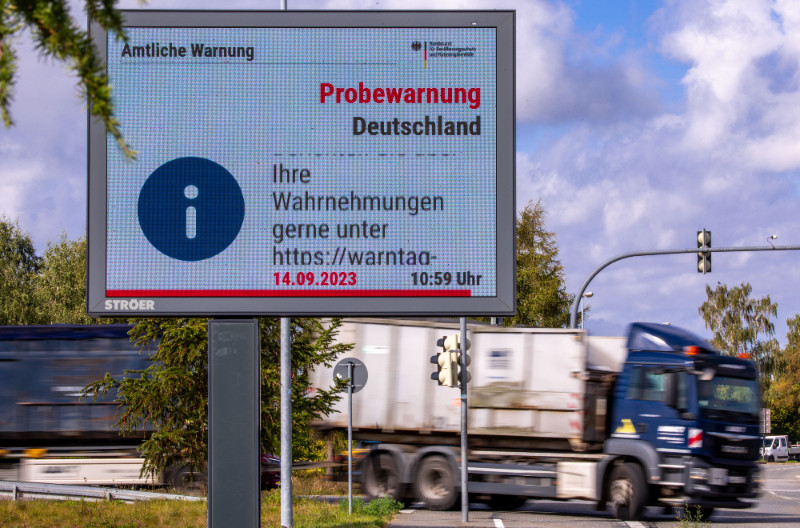Put it in your diary now - on Thursday, September 11th at 11am, you should expect to hear a few alarms going off or your phone buzzing.
The nationwide Warntag, which takes place every year on the second Thursday in September, is used to test the warning systems that would alert populations in the event of a disaster. This could be the case, for example, during floods, a huge power outage, or a cyber or military attack.
Warning against a hypothetical disaster scenario is a joint exercise involving the federal government, states, districts and municipalities. Around 38,000 sirens will be used for the test alarm, which the Federal Office of Civil Protection and Disaster Assistance (BBK) will activate around 11am.
The piercing ring will be broadcast via warning apps like NINA or KATWARN, radio and TV stations, as well as via nearly 6,600 digital display boards directly controlled by the BBK. Announcements will also be broadcast on trains.
A cell broadcast, which sees smartphone users receive a warning message without having to be signed up to an app or a specific provider, is also triggered on Warntag. This is an independent service that requires a mobile network, but works independently of SMS or an internet connection. Most smartphone users receive a pop-up alert message unless, for instance, their phone's software is not up to date.
The event will be over by 11:45am when an 'all clear' message will be broadcast on certain channels.
READ ALSO: Should you get Germany's extreme weather emergency warning app?

Will I hear sirens or loudspeakers?
In areas that are particularly at risk of disaster events you can expect to hear more sirens and even loudspeaker vehicles.
But in a lot of places - including most cities - there are no sirens.
After the end of the Cold War, many sirens were dismantled because they were no longer seen as needed and maintenance was too costly. There are currently around 10,000 in Bavaria, most of them owned by local authorities. Meanwhile, North Rhine-Westphalia has around 6,150 sirens.
In areas without sirens, emergency services rely on loudspeaker announcements from cars in emergencies. However, efforts are being made to change this, with funding programmes devoted to building or repairing sirens.
Why does Germany have a warning day?
The importance of alarm systems was highlighted by the flood disaster in the western states of Rhineland-Palatinate and North Rhine-Westphalia in July 2021, when people were not informed in time of the impending danger. Afterwards, a broad debate arose on how this could be improved, and the 'cell broadcast' system was introduced.
Meanwhile, amid war in Europe, many people are hyper-vigilant about what Germany would do in the event of a wide-reaching emergency.
READ ALSO: Who would be affected by Germany's new military service draft law?
Germany's first Warn Day took place in September, 2020, but many complained that it was not effective nor wide-reaching enough.
How common are nationwide warnings in Germany?
In practice, nationwide warnings - apart from trial alerts - are an exception. Mostly, warnings in Germany are issued locally or regionally, for example during forest fires.
The number of trial alerts in Germany also pales in comparison to many other countries. The Netherlands, for example, has a similar density of sirens in relation to its size and a test alarm is sounded on the first Monday of every month.
READ ALSO: EU tells citizens to stockpile three days of supplies in case of attack or disaster

Comments